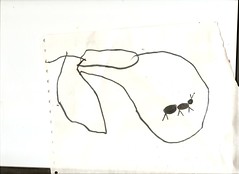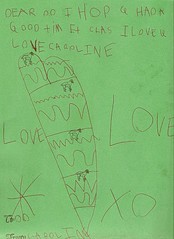lessons as web pages.
"Users can create content!"
interactive learning games
customizable flashcards
Embed videos--youtube.
Pop up text on images
Drag and drop image labeling exercises.
Click and label image exercises.
Assessment--as many varieties of angel--looks better, easier to navigate than Angel--still some gliches when Chalktalk interacts with Angel. Weirdly, enough,if you hide of the angel banner at the top or get rid of the Angel frame, Softchalk looses touch with angel. Works better with Firefox.
you can deliver via Angel or internet. Detailed instructions for Angel integration. Upload it as SCORM file
30 day free trail. $350 dollars/year. Distance learning has access to some licenses.
Monday, April 20, 2009
Saturday, April 11, 2009
I rewatched the BSG series finale
In the end it is all about the stories of the couples.
The action show that is the first part of the finale, with the gunfire and the symbolism and the getting the girl back, and the how did Laura get to the CIC?...it just doesn't work, but that's ok because...
Adama and Laura are the heart of the story. Really, they wanted to tell you about the sentimental military leader and the hard-nosed civilian leader.
It is all set up to cut off at the end of the Adama-Laura story. He says "it reminds me of you," and then there is a long black out. After that they give you the epilogue with angel-six and angel-Baltar and the fearful images of Japanese robots. They should have ditched the epilogue.
The Apollo-Starbuck story is a FAIL. Not just because of the loose ends, but because the storytellers didn't know where to go with it. They never did. How to make a love story out of the original show's action hero buddy pairing? How to actually get Batman in bed with Robin? And have Robin be, not just more than a sidekick, but some kind of spiritual presence? This is beyond current storytelling technology.
The Baltar-Six story. He says "I do know about farming, you know," and cries, and she says "I know, it's ok." That is the win for the show.
The action show that is the first part of the finale, with the gunfire and the symbolism and the getting the girl back, and the how did Laura get to the CIC?...it just doesn't work, but that's ok because...
Adama and Laura are the heart of the story. Really, they wanted to tell you about the sentimental military leader and the hard-nosed civilian leader.
It is all set up to cut off at the end of the Adama-Laura story. He says "it reminds me of you," and then there is a long black out. After that they give you the epilogue with angel-six and angel-Baltar and the fearful images of Japanese robots. They should have ditched the epilogue.
The Apollo-Starbuck story is a FAIL. Not just because of the loose ends, but because the storytellers didn't know where to go with it. They never did. How to make a love story out of the original show's action hero buddy pairing? How to actually get Batman in bed with Robin? And have Robin be, not just more than a sidekick, but some kind of spiritual presence? This is beyond current storytelling technology.
The Baltar-Six story. He says "I do know about farming, you know," and cries, and she says "I know, it's ok." That is the win for the show.
Thursday, April 02, 2009
Isabella Rossillini's Green Porno
Why didn't someone tell me about Isabella Rosillini's Green Porno earlier. It's brilliant.
Sunday, March 29, 2009
Monday, March 23, 2009
Saturday, March 21, 2009
Do all fictions occur in fictional worlds?
(with Battlestar spoilers)
So the big reveal in the series finale is that the characters we are watching our are ancestors, and that Hera, in particular, is the mitochondrial Eve. To normal people, this is just a nice plot twist. For people like me it is a little metaphysical puzzle.
Up to now, Battlestar has been painting a picture of a fictional world, a place that is like ours, but different in fairly rule governed ways. World-making like this has has been very popular in nerd fiction ever since Tolkien, and audiences have very high expectations of fictional worlds. Fictional languages now have to have invented grammar. We are expected to imagine all sorts of things are happening off screen. The Galactica presumably has a method for recycling waste. Somewhere there is a fictional person who wrote the fictional counterpart to "All along the Watchtower."
But fictional world-making is fairly new to art, and is still unusual as an explicit goal of an artwork. The recent miniseries about John Adams with Paul Giamatti and Laura Linney was historical fiction. We are not supposed to imagine that there is an alternative colonial America where it takes place. We are supposed to imagine it takes place in the real colonial America. But can we really do this, or in imagining, do we create a fictional universe? You might think we have to create a fictional universe, simply to deal with the fictional elements of the historical fiction. If the miniseries shows John and Abagail having a certain intimate conversation, where they treat each other as equals, we imagine that this is a part of long relationship full of such conversations, even though such a relationship may not have existed. Thus a parallel fictional world is created.
But this all seems to have too many moving parts. Suddenly, John Adams is not a fictional representation of American history, but a fictional representation of a fictional universe that resembles American history. But that can't be right. It is not like John Adams is some kind of steampunk alternative history where punchcard computing helps Washington defeat the British. It makes sense to say there is both a fictional representation and a fictional world for Battlestar because the writers go out of their way to make you feel like you are watching an incomplete representation of someplace very different, down to shaky cameras.
This is just a part of the problem of fictional reference, and I suppose the final twist in Battlestar doesn't really add anything to the debate. But it does blur the line between science fiction and historical fiction in a weird way. When the reveal happens, we are meant to feel as though the fictional world has been revealed to be our world. The emotional impact of the reveal wouldn't exist without this jab into the world of historical fiction. But the fictional world of Battlestar hasn't actually changed. It is still obviously fiction, because no one expects us to believe we have robot ancestors.
Hrm, if I had time in my life to do real philosophy I could figure this out.
So the big reveal in the series finale is that the characters we are watching our are ancestors, and that Hera, in particular, is the mitochondrial Eve. To normal people, this is just a nice plot twist. For people like me it is a little metaphysical puzzle.
Up to now, Battlestar has been painting a picture of a fictional world, a place that is like ours, but different in fairly rule governed ways. World-making like this has has been very popular in nerd fiction ever since Tolkien, and audiences have very high expectations of fictional worlds. Fictional languages now have to have invented grammar. We are expected to imagine all sorts of things are happening off screen. The Galactica presumably has a method for recycling waste. Somewhere there is a fictional person who wrote the fictional counterpart to "All along the Watchtower."
But fictional world-making is fairly new to art, and is still unusual as an explicit goal of an artwork. The recent miniseries about John Adams with Paul Giamatti and Laura Linney was historical fiction. We are not supposed to imagine that there is an alternative colonial America where it takes place. We are supposed to imagine it takes place in the real colonial America. But can we really do this, or in imagining, do we create a fictional universe? You might think we have to create a fictional universe, simply to deal with the fictional elements of the historical fiction. If the miniseries shows John and Abagail having a certain intimate conversation, where they treat each other as equals, we imagine that this is a part of long relationship full of such conversations, even though such a relationship may not have existed. Thus a parallel fictional world is created.
But this all seems to have too many moving parts. Suddenly, John Adams is not a fictional representation of American history, but a fictional representation of a fictional universe that resembles American history. But that can't be right. It is not like John Adams is some kind of steampunk alternative history where punchcard computing helps Washington defeat the British. It makes sense to say there is both a fictional representation and a fictional world for Battlestar because the writers go out of their way to make you feel like you are watching an incomplete representation of someplace very different, down to shaky cameras.
This is just a part of the problem of fictional reference, and I suppose the final twist in Battlestar doesn't really add anything to the debate. But it does blur the line between science fiction and historical fiction in a weird way. When the reveal happens, we are meant to feel as though the fictional world has been revealed to be our world. The emotional impact of the reveal wouldn't exist without this jab into the world of historical fiction. But the fictional world of Battlestar hasn't actually changed. It is still obviously fiction, because no one expects us to believe we have robot ancestors.
Hrm, if I had time in my life to do real philosophy I could figure this out.
Friday, March 20, 2009
It is good that all the couples are together on the real live Earth
I wasn't down with the face-off dialogue between brother cavil and baltar, and the epilogue with the sony aibos and the other proto-cylon toys. And, lets face it, the Starbuck storyline, and the storyline with Baltar's imaginary 6: these weren't resolved satisfactorily.
But I'm happy with it. Ron Moore earned the Jimmi playing Dylan at the end.
But I'm happy with it. Ron Moore earned the Jimmi playing Dylan at the end.
Thursday, March 19, 2009
Wednesday, March 18, 2009
Another cite for the claim that it is difficult to compare mental states across vast differences in circumstance and culture
This doesn't look like it speaks directly to the worry I want to dismiss in a paragraph, but it might be a more up to date citation to give for "meaning isn't in the head" concerns than the twin earth stuff.
from the Miscellany section of Characteristics
Were we in a disinterested view, or with somewhat less selflessness than ordinary, to consider the economies, parts, interests, conditions and terms of life which nature has distributed and assigned to the several species of creatures around us, we should not be apt to think ourselves so hardly dealt with. But whether our lot in this respect be just or equal is not the question with us at present. 'Tis enough that we know "there is certainly an assignment and distribution: that each economy or part is so distributed is in itself uniform, fixed and invariable, and that if anything in the creature be accidentally impaired; if anything in the inward form, the disposition, temper or affections be contrary or unsuitable to the economy or part, the creature is wretched and unnatural.
Judging by google search, the word 'disinterested' doesn't seem to come up in aesthetic contexts in characteristics. Also, Shaftesbury seems far more concerned with theodicy than aesthetics.
Comparing Shaftesbury to the Buddhist nature poems I consider in my essay is interesting. Both works assert that by taking up a selfless frame of mind in the presence of nature, one can attain sacred knowledge. But how they conceive the knowledge is very different, because of the different attitudes toward suffering in the two religions. Shaftesbury sees suffering as part of a just larger order, and links it to punishment of those who do not contribute to the order. The Buddhist view cuts suffering off at the root, so that the selfless person simply ceases to experience suffering.
lets try this quote.
New forms arise, and when the old dissolve, the matter whence they were composed is not left useless, but wrought with equal management and art, even in corruption, Nature's seeming waste and vile abhorrence. The abject state appears merely as a way to some better. But could we nearly view it, and with indifference, remote from the antipathy of sense, we then perhaps should highest raise our imagination, convinced that even the way itself was equal to the end
So for Shaftesbury, disinterestedness meant looking beyond the narrow good of the self, or of any subset of the whole universe. Once you view the world sub specie aeternitas you can see both divine beauty and divine goodness.
Perhaps I should get the book through ILL. Or maybe just buy it. I don't know which would be faster.
Shaftesbury's notion of aesthetic disinterestedness
One reason one might be reluctant to compare aesthetic disinterestedness with Buddhist nonattachment is that the former is generally thought of as a secular concept while the latter is explicitly religious. However, aesthetic disinterestedness has been linked with religious ideas since the beginning. Shaftesbury's primary aesthetic interest was in the religious contemplation of nature, which he felt afforded a view into a greater order than any human art. Thus in The Moralists the character Philocles begins an invocation of the beauty of nature like this.
I'm not going to get this done over spring break. My head hurt so much this morning I had to take a nap. I'm having trouble focusing. Winter has returned and the kids are back inside making noise. Maybe I should focus on classwork. Maybe I can keep writing a little bit every day once classes start again. Actually if this is going to get done, I'm going to have to.
Oh glorious nature! supremely fair and sovereignly good! All-loving, all-lovely all-divine! Whose looks are so becoming and of such infinite grace; whose study brings such wisdom and whose contemplation such delight; whose every single work affords an ampler scene and is a nobler spectacle than all which art ever presented!Disinterestedness enters the picture because seeing this divine order requires one to set aside earthy interests.
Since by the, or sovereign mind, I have been formed such as I am, intelligent and rational, permit me that with due freedom I may exert those faculties with which you have adorned me. Bear with my venturous and bold approach. And since nor vain curiosity, nor fond conceit, nor love of aught save thee alone inspires me with such thoughts as these, be thou my assistant and guide me in this pursuit, whilst I venture thus to tread the labyrinth of wide nature and endeavor to trace the in thy worlds.Arg, that didn't quite say what I want it to say. The passage right after might be better, but I am reading the book in google preview, and can't get the next pages. In any case, I think Shaftesbury's sub specie aeternitas approach to aesthetics, probably makes him disinterested and cognitive, rather than disinterested and noncognitive, as I had had him.
I'm not going to get this done over spring break. My head hurt so much this morning I had to take a nap. I'm having trouble focusing. Winter has returned and the kids are back inside making noise. Maybe I should focus on classwork. Maybe I can keep writing a little bit every day once classes start again. Actually if this is going to get done, I'm going to have to.
Subscribe to:
Posts (Atom)






